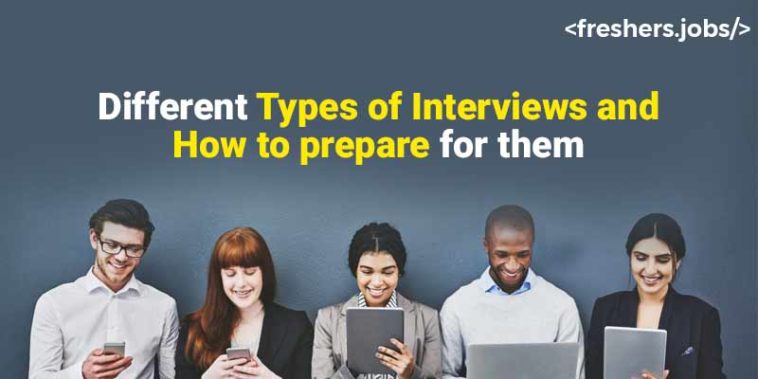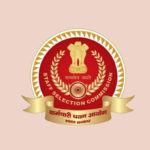Interviews are a way for recruiters to find out more about candidates and narrow their search for the right person to fill a job opening. During an interview, the hiring manager may ask candidates questions to test their skills and learn more about their experiences related to the role. Learning about the types of interview hiring managers conduct can help you prepare for each one as you look for a job.

Going on interviews for different jobs can help you be ready for the different kinds of discussions. Depending on the job, an interviewer might ask additional questions or use other formats to learn about a candidate. Learning about these different ways to approach an interview can help you prepare for each. Know the Interview Tips For Freshers. This blog tells you about different kinds of interviews and gives the advice to get ready for your job search.
Let us see the main types of Interviews
Recruiters conduct different kinds of interviews to find out talented candidates. Or the type of interview could depend on the circumstances of the interview or be better suited for a particular job position. Here are the various types of interview:
Face to face Interviews
In a face-to-face interview, you and the interviewer discuss your qualifications. The interviewer can be the boss, a manager, someone from the HR department, or a third-party recruitment consultant hired by the company. Most of the time, the interview takes place at the company. After asking you general questions about your types of interview skills, education, and experience, the interviewer will usually move on to see how knowledgeable you are about a specific subject.
How to prepare for it
- Research the company and how they do things at work to prepare for these interviews. Know how to How To Research About A Company Before Joining.
- You may have an advantage over other applicants if you have extensive knowledge about the company’s operations, work ethics, and culture.
- Body language is another essential thing to keep in mind during face-to-face interviews.
- Be sure of yourself and be at ease during the interview.
- Use this chance to meet the interviewer in person to make a good impression.
Interview with Panels
In a panel interview, you answer questions from more than one person. Many times, people from different parts of an organisation, such as human resources, your recruiter, and sometimes even team members, explain about what are the different types of interviews. Since they usually have other jobs, they may ask questions about different business parts. For example, a person in human resources might ask you about your salary expectations, while a team member might ask you about how you work with others.
How to get prepared
- In a panel interview, you need to make a good impression on all interviewers to improve your chances of getting the job as preparation tips.
- Greet the people on the panel when you walk into the room for the interview. During the interview, look at each person on the panel while speaking.
- But when you answer, talk to the person who asked the question.
- Make sure that how you answer questions and follow-up questions from different interviewers is the same.
Interview by phone
Hiring managers and recruiters often conduct phone interviews to find out more about their first candidates and discuss the various types of interviews. Most of the time, the interviewer will set up a phone call with you. Then, they can ask you to introduce yourself, tell them briefly why you are a good candidate and tell you more about the job. Read through How To Introduce Yourself In An Interview.
If the phone interview goes well, you might be asked to attend a regular interview. If the job is remote, phone interviews can also be used instead of video calls. Make sure you know what the call is for and get ready for it accordingly. If it is just a screening interview, ensure you have read over the job description and the information in the documents you sent in with your application.
How to get ready
- A good thing about a phone interview is that you can look at your notes while talking, which is one of the types of interview.
- But try to prepare for it as you would for a formal in-person interview.
- You can also use gestures and body language to say what you want in a face-to-face interview.
- So, make sure you speak clearly and quickly and do not pause for too long.
- Try to find a place for the interview that is quiet and free of other things going on.
Video interviews
Companies usually use video interviews for remote jobs alert or when candidates cannot come to an interview in person. You can join a video call interview with a PC, laptop, or smartphone. You may need to install your employer’s software for teleconferencing to do the interview.
How to get prepared
- You can prepare for a video interview, one of the various types of interview how you would for a face-to-face interview regarding how to answer interview questions.
- Dress for the interview by putting on clean, neat clothes.
- Have a reliable internet connection that moves at a decent speed.
- You can look for a place with silent background and set up your workspace well.
Interviews in groups
During this interview, companies talk to more than one candidate simultaneously. Most of the time, companies use group interviews when they need to hire many people in a short amount of time. The interviewer can ask the whole group a question at once, or they can ask each candidate to answer independently. They may also ask you to talk to other candidates or give you a task to do as a group to see how well you communicate, get along with others, and work as a team with types of interview skills. Go through the Group Discussion Tips and perform well in this round of interviews.
For instance, the interviewer might ask all the candidates in the room to split up into small groups. Each team may need to talk to its members to get to know them better. After giving the candidates time to get to know each other, the interviewer may ask each person who they think would make a good leader for their team and why.
How to get ready
- You can look at yourself and stand out during a group interview.
- When you need to, say what you think clearly and confidently.
- You can listen carefully when others are talking.
- Respect what other people think and be nice to them.
- Try to show that you are a positive person who is good at solving problems.
Off-site interviews
Most interviews that happen away from the office are casual. The person in charge of hiring may want to meet with you for lunch or dinner. Your manners and personality may be given more attention, and you will know about what are the different types of interviews. The interviewer may watch you at the table and judge your social skills and table manners based on what they see.
How to get ready
- Even if the interviewer tries to make you feel at ease by making the atmosphere casual, you should still act professionally.
- Be careful when you eat and drink, so you don’t mess up your dress or the table.
Stress interviews
Companies use “stress interviews” to determine how a candidate acts when they are under pressure. You might have this interview if you are applying for a high-stress job. The interviewer might try to figure out how well you can solve challenging problems, handle multiple tasks at once, or deal with demanding clients.
How to get ready
- To make you feel stressed, the interviewer may ask you strange questions, interrupt you often, speed up the interview, be rude to you, act strangely, or give you a particular task so that you must know various types of interview.
- You might feel uncomfortable or scared, but try to stay calm, handle the situation with grace, and keep your mind on finding a solution.
Interviews with a plan
In a structured interview, all of the candidates are asked the same set of questions. The interviewer then looks at how each candidate answered to find the best one. In a structured interview, the questions you are asked can be either open-ended or closed-ended. When asked a closed-ended question, you usually have to pick the correct answer from a list. Open-ended Questions can have more than one answer, and you may be able to give more detail in your answers.
How to get ready
- The best way to prepare for a structured interview is to find out what questions are usually asked and think of answers ahead of time.
- Ask yourself what skills you already have that will help you do well in the job.
Conclusion
I hope you are clear about the blog on types of interview that are the doors that lead to your dream job. Almost every interview is different and requires the person being interviewed to look for and learn more. Every interview should be done with a new sense of excitement since they decide whether or not a job offer will be made. Have a good attitude to make an excellent first impression on the recruiter. Now that candidates have more information about the different types of interviews for freshers jobs, they can prepare for each and do well.



